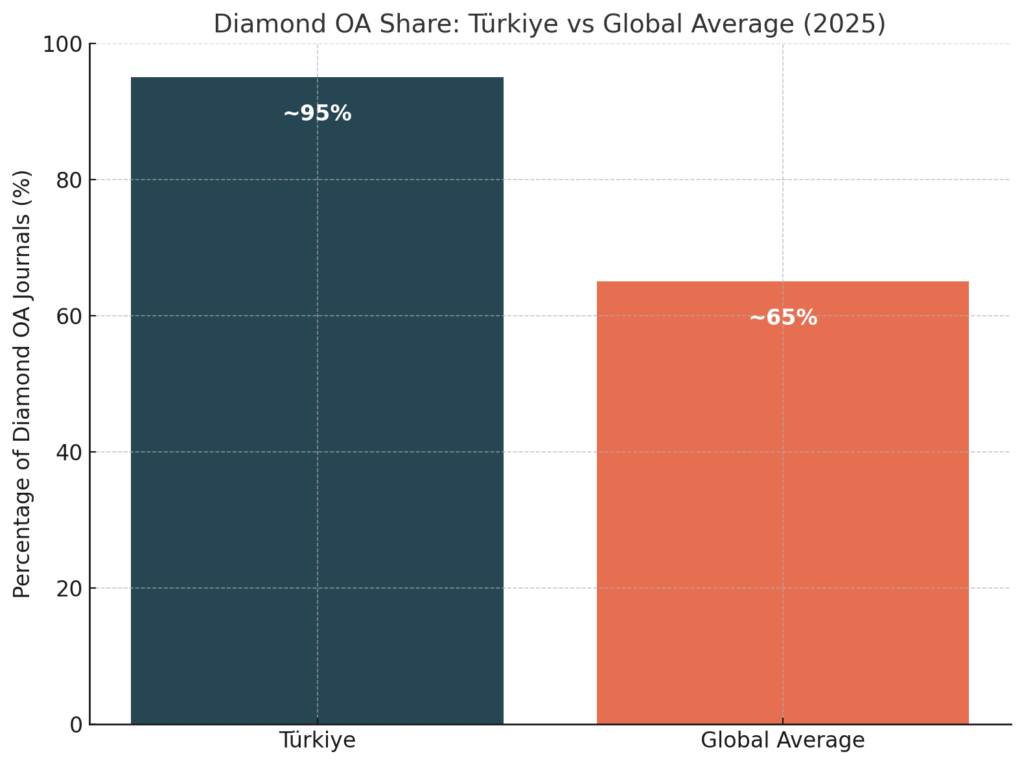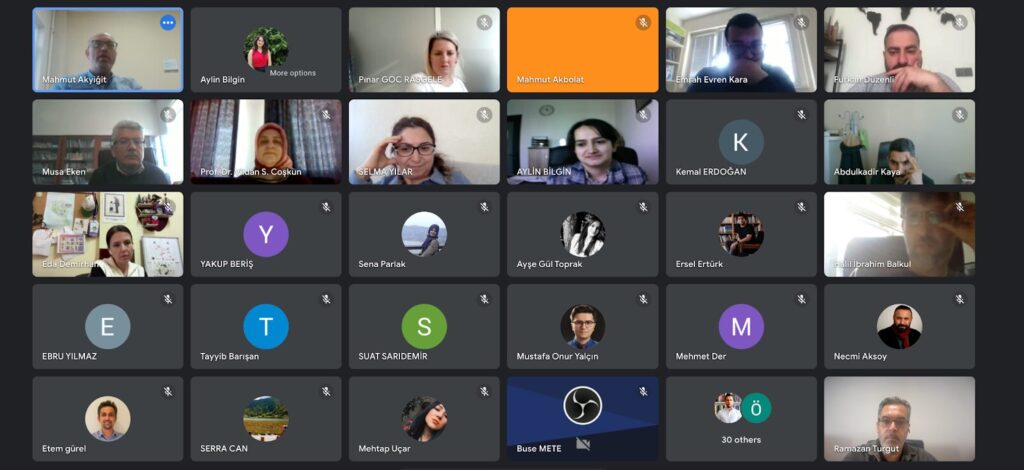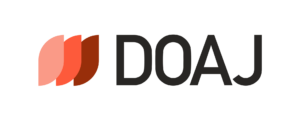Ramazan Turgut, DOAJ Ambassador and Managing Editor for Türkiye, provides an analysis of Türkiye’s open access landscape, highlighting critical infrastructure, strengths, and challenges. Ramazan also proposes actionable recommendations to enhance sustainability and international visibility.
Türkiye’s OA landscape
Although there is no single, complete registry of open access (OA) journals in Türkiye, the DIAMAS Türkiye Country Report provides a valuable snapshot. The report estimates approximately 3,500 academic journals nationwide, with 1,190 indexed in TR Dizin, 220 in Web of Science, and 587 in DOAJ (as of September 2025). On the platform side, DergiPark hosts approximately 2,500 open-access journals, with approximately 95% of these being Diamond, and supplies Crossref DOIs for around 1,500 journals through its sponsorship arrangement. Open access is already the default in practice: about 85% of articles in TR Dizin and 75% of all articles in Türkiye are OA. DergiPark operates on ULAKBİM Journal Systems (UDS), which records acceptance/rejection rates, as well as processing times. Language data also shows bilingual practice at scale, with roughly 75% of articles in Turkish and 25% in English, as well as small shares in Arabic, German, Russian, French, and other languages. Coverage spans the university system; for example, 1,507 journals from 182 universities appear on DergiPark. TR Dizin audits journals against COPE-aligned editorial and ethical criteria and plans impact-based classifications, while national read-and-publish deals with Wiley (2023–2025) and Springer (2024–2026) add thousands of OA articles each year.
Why is the Diamond share so high ( ~95%)?
Most of these journals operate as Diamond OA, without any APCs (Article Processing Charges). This means the Diamond share in Türkiye is significantly higher than the DOAJ global average of ~65%. These figures highlight a growing community that values openness and publicly funded models. Several structural factors can explain why the share of Diamond journals is so high. State‑backed hosting and workflows through DergiPark reduce baseline costs, while university funding and a volunteer editorial culture support journals without APCs. Additionally, TR Dizin’s criteria do not favor APC‑based models and YÖK’s (The Council of Higher Education) stance against predatory venues promotes transparent practices. Also, the disciplinary mix, especially in the social sciences and humanities, favors community‑driven publishing.
What enables this progress?
Türkiye’s OA infrastructure has developed to meet practical needs. As the number of university-based journals grew, editors needed reliable hosting, a standardized editorial process, and persistent identifiers. Readers required dependable access and libraries sought clear quality indicators. TÜBİTAK ULAKBİM (the National Academic Network and Information Center) responded by creating a public service stack: DergiPark for hosting and workflow, TR Dizin as a national index with editorial and ethical standards, and Aperta Türkiye for data sharing and long‑term access. Through routine training and support, ULAKBİM helped editorial teams enhance the visibility of licensing, peer-review processes, and transparency on their websites and in article files.
How do these services link?
DergiPark’s ULAKBİM Journal Systems (UDS) standardizes submission and tracking, collects ORCID iDs, and assigns Crossref DOIs through a sponsorship arrangement. Journals manage policies and workflows in DergiPark; accepted content then exposes structured metadata to Crossref and library discovery layers. TR Dizin evaluates journals regardless of platform, yet many DergiPark titles apply and, checks on scope, peer review, and editorial oversight reinforce the same practices that DOAJ expects. Aperta Türkiye offers authors and journals a place to deposit data and materials linked from articles via DOIs. YÖK guidance discourages deceptive venues and urges clearer policy pages. ANKOS (Anatolian University Libraries Consortium) supports libraries in aligning discovery and negotiating agreements that increase OA output.
Because the services are public and coordinated, barriers are lower for editors, policies become more visible and traceable, metadata stays consistent and bilingual practices can be supported on a large scale. The process from submission to publication is also easier because DergiPark manages workflow and identifiers and TR Dizin establishes a national quality standard. DOAJ offers an international marker of openness-quality and Aperta supports reproducibility. These connections are a main reason for the high Diamond share and the growth shown in the figures below (Figure 1).

What Türkiye does well
Türkiye’s strengths shine through in production, policy, and daily practices. Public support and institutional commitment make Diamond publishing the default, so authors seldom pay fees and readers get immediate access. Many journals provide titles, abstracts, and often full texts in both Turkish and English, which broadens readership and aids indexing and reuse. Editors and librarians collaborate via national services and regional networks, sharing templates, training, and tools that reduce learning curves. Platforms like UDS and OJS streamline submission and tracking, enable DOI registration and ORCID collection, and enhance the quality of metadata sent to DOAJ, Crossref, and library discovery systems. Collectively, these elements create a dependable path from submission to publication for hundreds of university-managed titles.
What still needs attention
Despite steady progress, several areas still need improvement. Open access, copyright, and licensing notices are not always clearly visible or consistent across journal sites and within article files; in some cases, the specific Creative Commons license is missing or omitted from PDFs. Peer review descriptions are often brief, and many article pages lack submission, acceptance, and publication dates, which hinders traceability. Endogeny presents a recurring risk. When editors, editorial board members, or listed reviewers frequently publish in their own journal, diversity suffers. In DOAJ assessments, we use a practical threshold to identify potential conflicts of interest: keep authorship below 25% in each of the last two issues or over the past calendar year. Funding and staffing remain fragile, heavily relying on institutional budgets and volunteer effort that receive limited formal recognition. A small number of sites still lack mobile-friendly design, persistent identifiers, preservation arrangements, and machine-readable outputs like JATS XML, which restricts long-term access and reuse.
Next steps for journals to ensure quality and sustainability
- Make policies unmissable. Place open access, licensing, and copyright terms on the journal website and repeat them in every PDF and HTML article. Link to the exact Creative Commons licence.
- Show your editorial process. Describe who reviews submissions, which review model you use, how conflicts are handled, and how decisions are made. Add submission, acceptance, and publication dates to each article.
- Watch endogeny. Keep the share of articles authored by editors, board members, or listed reviewers under one quarter (25%) in each of the last two issues or the last calendar year. Rotate special issues and guest editors with clear oversight.
- Invest in metadata. Capture ORCID iDs, funder names, grant numbers, and reference lists. Deposit article metadata with DOAJ and Crossref to improve discovery.
- Stabilise funding. Explore consortial support at the university or regional level and recognise editorial work in promotion criteria. Where budgets allow, allocate small stipends for managing editors and copy‑editing.
DOAJ in Türkiye: collaborations and outreach*
Led by DOAJ Managing Editor Ramazan Turgut, our work in Türkiye brings together a growing network of volunteer editors from different disciplines. Their steady, behind-the-scenes effort helps journals align with DOAJ criteria, clarify policies, and submit stronger applications. As a result, there has been a steady increase of Turkish journals indexed in DOAJ since 2020 (Figure 2). We are grateful for their contribution to the visibility of Turkish journals in DOAJ.

In collaboration with DergiPark and TR Dizin, we participate in events by invitation, both in person and online, whenever schedules and resources permit. These appearances focus on OA policies, licensing, and transparent peer review practices, with real examples and brief live demonstrations. We adapt the focus to the audience when necessary, for instance, discussing editorial policies for humanities journals or metadata and identifiers for STEM journals.
In response to requests from editors in Türkiye, we launched university-focused online training workshops in January 2025. These sessions are not just slide decks; we review actual journal websites and applications live, answer questions in real time, and offer brief one-on-one feedback when possible. The format is not recorded, which encourages open discussion. Participants have described the sessions as practical and have helped reshape how they approach scholarly publishing.
Members from institutions that attended these workshops often report improved policy pages, visible licenses at the article level, and more detailed peer-review descriptions in subsequent applications.
We will continue this outreach and add extra dates when demand is high, within the limits of our available resources. Editors from Turkish journals who would like to host a session or join the volunteer pool can contact us. Sessions are available in Turkish or English, and we adapt the depth and pace to the needs of the journal team.

Conclusion
Türkiye’s strong commitment to Diamond OA positions it as a leading force in regional and global scholarly communication. Nonetheless, the journey is far from complete. Addressing lingering issues such as financial sustainability, editorial independence, technological capacity, and internationalization will necessitate ongoing investment, policy refinement, and collaborative learning. Support for editors, the adoption of new technologies, and the expansion of multilingual metadata are essential elements of this path forward.
As Türkiye maintains this momentum, while embracing innovation and partnership, it will be well-positioned to lead the next phase of global OA development, one rooted in equity, quality, and broad-based scholarly participation. The DOAJ community will continue to be an active partner, providing training, pre-screening feedback, and international visibility. This support will enable Turkish journals to not only meet, but also influence, global best practices.
About the Author
Ramazan Turgut, actively promotes ethical standards and international collaboration in scholarly publishing. His work supports the sustainable development and global visibility of Türkiye’s open-access scholarly ecosystem. AI has been used for data analysis and visualization of statistics in this post. However, the final post has been written and edited by Ramazan Turgut.

*Ambassador programme and outreach
Please note that outreach activities by DOAJ Ambassadors are tailored to each region, and our resources are limited. Activities and opportunities for training and workshops mentioned in this blog might not be available to you or your region.
You can read more about our Ambassador programme and the regions we cover here.

